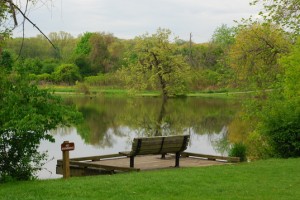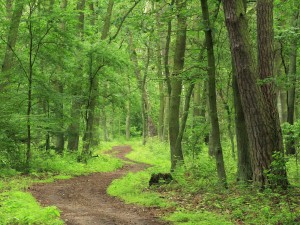University of Michigan Study Concludes Even Slight Contact with Nature Improves Focus
Jesse Baum
University of Michigan at Ann Arbor’s psychology and industrial engineering departments recently collaborated to test the hypothesis that interacting with nature (taking a stroll through the park or being in a “green space”) or even looking at pictures of nature (landscape images, such as a picture of Lake Champlain) works to improve mental function, especially with respect to attention span. Though there has been extensive research on the physical benefits of outdoor recreation (improving overall fitness, improving air quality, etc.) there has been less emphasis on the mental benefits that simply being around nature can have, making this study especially captivating to those looking to defend parks.

A park in Ann Arbor, Michigan. (source: AnnArborNews.com)
Specifically, the researchers were particularly interested in ART- Attention restoration Theory. Why study ART? The look at attention span with this study is very relevant to our society’s current increasing population of people with diagnosed attention deficit disorders. In addition, the current trend where children are using electronics at a far earlier age worries experts that this will lead to a further increase in these attention disorders.
The study consisted of two trial groups. In the first, the subjects were given several memorization exercises, then half took a walk through a secluded park, while the other took a walk through downtown Ann Arbor. After the walk, those that went to the park performed better than before on a second round of tests, while those that were in the classic urban environment did not improve.
The second test was similar, only after the first cognitive tests the subjects viewed photographs rather than going for a walk. Half of them looked at outdoor scenes, while the other half viewed images of urban environments. Once again, the group that was “exposed” to nature performed better on their second round of tests.

Even looking at a stock photo of nature, such as the one pictured here, can have a positive effect on focus. (source: terawallpaper.com)
Both trials were simple- but the study as a whole carries intense potential ramifications. Currently, planting trees and shrubs is considered something of a long-term investment, in terms of shade, carbon and particulate capturing and mitigating the heat island effect the investment. However this study is evidence that “greening” neighborhoods can have immediate effects on its residents.
The study above offers substantial evidence that some of the positive effects of exposure to the natural world can be accessible to people living in cities – what effect could this information have on cities that are undergoing radical restructuring, like Detroit? What difference could it make in developing countries, with rapidly urbanizing populations? We know that with coastal flooding and desertification, the amount of available, livable land is shrinking- shouldn’t this mean that smarter, greener cities are in order?
The full link to the study may be found here
